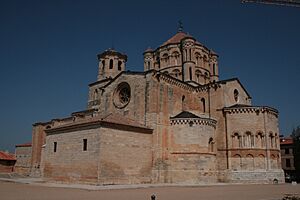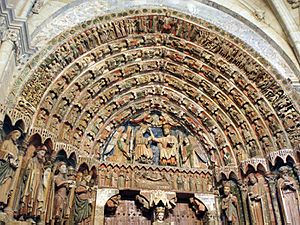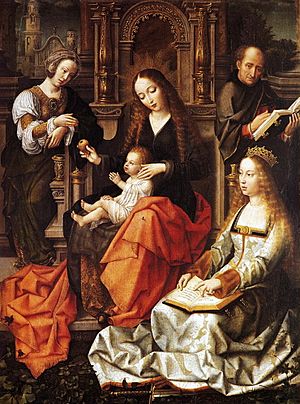Collegiate church of Santa María la Mayor (Toro) facts for kids
The Collegiate church of Santa María la Mayor is a historic church in the town of Toro, located in the province of Zamora, Spain. Its name means "Saint Mary the Great," which is a common name for churches dedicated to the Virgin Mary. This beautiful building is a famous example of a special type of medieval architecture.
Contents
History and Design of the Church
The church is a great example of Romanesque architecture, a style known for its thick walls and rounded arches. It was built during a time when styles were changing, so it also has some features of the later Gothic style. Its design was inspired by other famous churches in Spain, like the cathedrals in Zamora and Salamanca.
When Was It Built?
Construction on the church started around the year 1170 and was completed in the middle of the 1200s. It took so long to build that historians believe at least two different directors managed the project. We can tell this because different types of stone were used. The older parts are made of limestone, while the newer sections use sandstone.
What Does the Church Look Like?
The church has a floor plan shaped like a cross, which is called a basilica plan. It has a long main hall called a nave and two smaller halls, or aisles, on each side.
One of its most famous features is the large dome over the center of the church. This dome is special because it has eleven sides, making it a hendecagonal dome. It is considered one of the four most important domes of its kind in the region. The roof over the main part of the church is made of curved stone ceilings called barrel vaults.
The Majesty Portico
A stunning feature of the church is the south entrance, known as the Majesty Portico (Pórtico de la Majestad). This entrance was added between 1284 and 1295. It is famous for its colorful painted sculptures. These carvings show scenes from the lives of the Virgin Mary and Jesus Christ, as well as a scene of the Final Judgment.
Art and Treasures Inside
The church is home to several important works of art.
The Virgin of the Fly
One of the most famous pieces is a Flemish painting called La Virgen de la Mosca, which means "Virgin of the Fly." It's a very unusual painting because it shows a realistic fly on the Virgin Mary's clothing.
Studies of the painting show that the fly was actually added to the painting after it was first finished. The same studies found other changes. For example, the halo around Mary's head was painted over a veil she used to wear.
Pregnant Virgin Sculpture
Another unique artwork is a sculpture of a pregnant Virgin Mary. This statue is very rare and dates back to the 13th century. It shows a different and more human side of Mary than most art from that time.
See also
 In Spanish: Colegiata de Santa María la Mayor (Toro) para niños
In Spanish: Colegiata de Santa María la Mayor (Toro) para niños
- History of medieval Arabic and Western European domes
 | James B. Knighten |
 | Azellia White |
 | Willa Brown |




